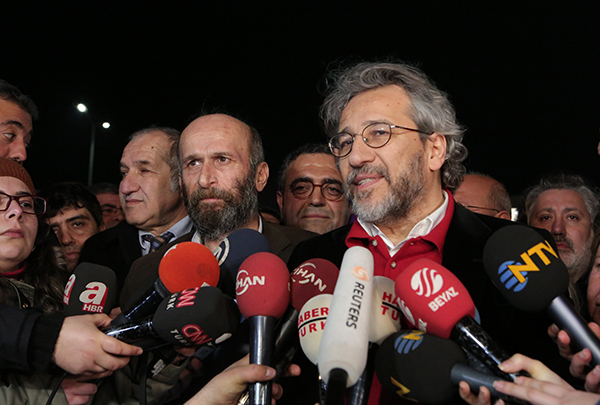Istanbul, February 26, 2016–The Committee to Protect Journalists welcomes the conditional release today of Turkish journalists Can Dündar and Erdem Gül, of the daily newspaper Cumhuriyet, and calls on authorities to drop all charges against them. The two, who spent 92 days in pre-trial detention, still face multiple life sentences if convicted of exposing state secrets, espionage, and aiding a terrorist group for publishing reports alleging Turkey tried to smuggle weapons to Islamists in Syria.
Dündar, the editor of Cumhuriyet, and Gül, the newspaper’s Ankara bureau chief, walked out of Istanbul’s Silivri prison early this morning, after the city’s 14th Court for Serious Crimes ordered their release, according to press reports. Turkey’s Constitutional Court had ruled on Thursday that the journalists’ detention in November violated their rights. The court’s ruling did not lift the travel ban or the charges against them, which carry maximum sentences of life without parole, according to press reports. The journalists’ trial is scheduled to start on March 25, the pro-government Daily Sabah reported.
“We celebrate Can Dündar and Erdem Gül’s freedom, but remain deeply concerned that they still face harsh prison sentences simply for practicing journalism,” CPJ Europe and Central Asia Program Coordinator Nina Ognianova said. “Dündar and Gül should not have spent a single day in jail. We commend the Constitutional Court for its decision, and call on Turkish authorities to drop the case against the journalists immediately.”
Dündar and Gül were arrested on November 26, 2015, in connection with reports published in Cumhuriyet in May and June 2015 that alleged Turkey’s National Intelligence Organization (MIT) had transferred weapons to Syria under the cover of humanitarian aid. President Recep Tayyip Erdoğan, who is a complainant against Dündar, in July 2015 told state broadcaster TRT: “The individual who has reported this as an exclusive story will pay a high price… I will not let him go.”
The legal team for Dündar and Gül on February 17 petitioned the Constitutional Court for their release. The court’s judges on Thursday agreed, by a vote of 12 to 3, with the lawyers’ argument that articles 19 and 26 of Turkey’s Constitution, which guarantee the rights to personal liberty and to freedom of expression, respectively, had been violated.
Presidential spokesman İbrahim Kalın, asked at a press conference today for comment on Dündar and Gül’s release, stressed to journalists that the court’s decision was “not a decision of acquittal, but a decision to release [pending trial]; the trial goes on.” Kalın compared the journalists’ situation to that of Wikileaks founder Julian Assange, who, fearing deportation to Sweden to face questioning on rape allegations, has taken refuge in Ecuador’s embassy in London since June 2012, or Chelsea Manning, who is serving a 35-year sentence in the United States for leaking classified documents to the website Wikileaks.
Turkey was among the world’s worst jailers of journalists in 2015, with 14 imprisoned at the time of CPJ’s annual census of jailed journalists on December 1. On February 24, Turkish media reported that Rohat Aktaş, a news editor for the Kurdish-language daily Azadiya Welat, had died after being trapped in a building with a gunshot wound he suffered on January 22 while covering fighting in the southern city of Cizre. Turkish police have arrested at least seven Kurdish journalists since December 1.
EDITOR’S NOTE: This text has been updated to clarify that the travel ban on the journalists was imposed by Istanbul’s 14th Court for Serious Crimes.
